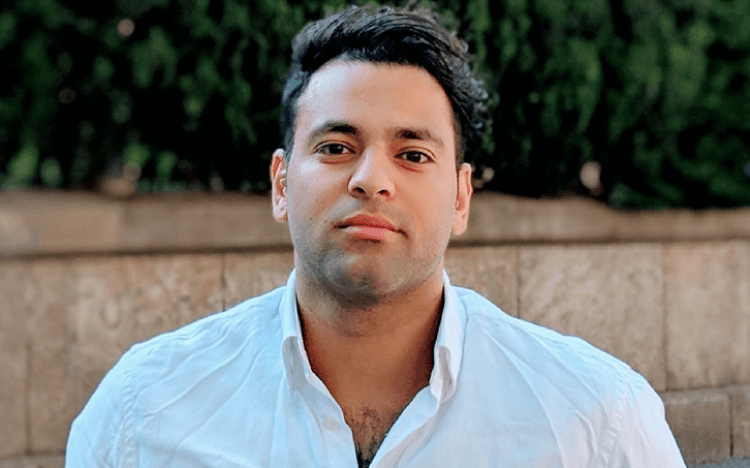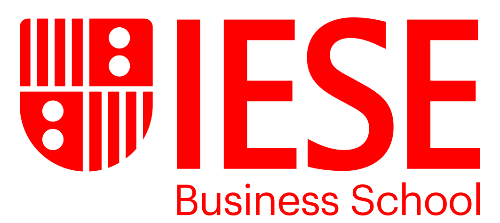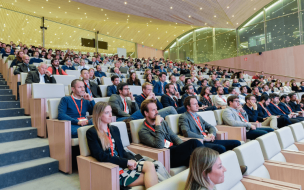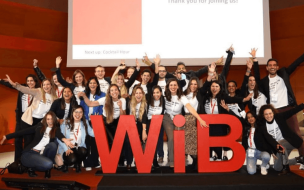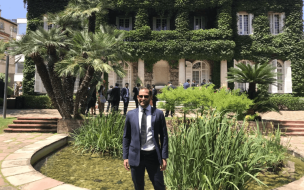His startup is trying to tackle the issue of accessibility to dentalcare. A quarter of respondents to a Federal Reserve report on the economic well-being of US households in 2014, a few years before Yash had his idea, said that in the prior 12 months they hadn't been to the dentist because of financial reasons.
Imagine a world where you could grab a quick dental checkup while getting ready for work in the morning, where you controlled time, not the other way round, and didn't have to spend a fortune to look after your smile. Smiletronix is an app combined with a device that users pop in their mouth for 10 seconds. It images their teeth and sends the data back to the app.
They then receive a health report and a score. The idea was to design an early warning system that identifies nascent dental issues and informs users that they should go to a dentist. Catching issues earlier on in the pipeline saves them money and means less painful and prolonged treatment later.
Yash has worked on the business full-time since graduating in 2018, and in October 2019 the business successfully completed the MetLife Digital Accelerator, powered by Techstars, in the US. The 13-week accelerator provides mentorship to startups to get their ventures off the ground.
The road to IESE Business School
Yash studied molecular biology at undergraduate level but realized quickly he didn’t want to spend his working life in a lab. That’s when he decided to focus on the business side, and studied a master’s in management of science, technology, and innovation, at the University of Manchester.
He then worked for a consumer electronics firm before trying his hand at entrepreneurship—the venture ultimately failed but it was a step in the right direction, towards startup success in the future.
Yash spent the next five years working for his uncle’s business, a telecommunications consultancy. He was only meant to work there temporarily in a role balancing customer relations and business development. He ended up leading the business development team as well as internal operations.
The time came when he wanted to move on though and begin to build a new career. A lot of the jobs he was looking at required additional qualifications, a CFA or an MBA for example, and that’s when he decided on the latter and began to research the market.
Yash had his eyes set on the US, but after visiting the IESE Business School campus and sitting in on a class his mind was made up.
“I really enjoyed the case study methodology,” he explains. “I loved the campus and the people I met, so IESE jumped up in my favorability. The US didn’t seem as big an attraction anymore, especially with the balance between European costs and US costs.
Becoming an entrepreneur
It was never the plan to launch something immediately after the MBA, Yash explains. He was involved with the entrepreneurship club and impact investing at IESE, but the idea was to graduate, work for three-to-five years and then try another startup.
But in the first year of the IESE MBA, he had the idea for Smiletronix. He hadn’t been to the dentist in around 10 months, despite the MBA tuition fee at IESE including free healthcare, including dental.
“It wasn’t a question of cost for me, it was a question of time,” he says. “I asked, ‘can my phone tell me if my oral health is okay?’, and that was the spark of the idea.”
Yash pitched the idea to a classmate of his, a medical device engineer from the US, who liked it and jumped onboard. It became their class project in second year, and during the New Ventures elective on the MBA they spent three months validating, testing, and developing their business idea.
Yash’s fundamental approach to business comes from his upbringing and revolves around doing business to help people and make the world a better place. He says he’s seen his parents, aunt, and uncle go through life helping others wherever they can, even if that means sacrificing their own happiness.
That’s why the IESE MBA was such a good fit. The school’s Doing Good Doing Well conference, an annual event that tries to tackle the challenges businesses have interconnecting with society, had a big impact on him.
“I think that’s had the biggest influence on the way I treat employees and approach business.”
After the MBA, it became apparent they needed to work on the idea full-time. They brought onboard a dentist, and another of their MBA classmates to work part-time, and have been working on the business since.
Lessons for an entrepreneur
When Yash launched his first business, he was only 22. He says that he lacked the knowledge on how to get a business up and running, and his sales skills weren’t refined. “I think that’s why it failed ultimately,” he adds.
It was his work experience immediately after that, for his uncle’s business, that began to shape him into the businessman who would eventually set up Smiletronix years later.
“It taught me how to interact with people, how to sell, build partnerships,” he recalls.
The MBA then augmented that skillset, teaching Yash about decision making, operations, and financial modelling. IESE also have a class called Advanced Business Problems (ABP), which exposes students to a plethora of case studies, and teaches them to think like a consultant; they learn how to minimize risk and take key business decisions, key traits for any entrepreneur.
All of this has culminated in a business that has the potential to change the way we approach dentalcare, if fundraising is a success. Yash was on the road in the US at the tail end of last year, and the nonstop travel and fundraising gave him a true glimpse into life as a nascent entrepreneur.
They’re aiming to take the product to market by summer 2020, he says, and have a fundraising target of $1 million. If all goes to plan, cheaper, more affordable dentalcare could become a reality.


